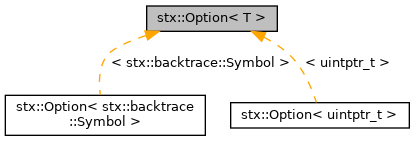 |
STX
1.0.0
|
 |
STX
1.0.0
|
#include <option_result.h>
Optional values.
Type Option represents an optional value: every Option is either Some and contains a value, or None, and does not. They have a number of uses:
None is returned on errorOption's are commonly paired with pattern matching to query the presence of a value and take action, always accounting for the Nones case.
C++ 20 and above
| using stx::Option< T >::value_type = T |
|
inlinenoexcept |
|
inline |
|
inline |
|
inlinenoexcept |
|
inline |
|
inline |
|
inlinenoexcept |
|
inline |
Returns None if the option is None, otherwise returns cmp.
Basic usage:
|
inline |
Returns None if the option is None, otherwise calls op with the wrapped value and returns the result.
Some languages call this operation flatmap.
Basic usage:
|
inlinenoexcept |
|
deletenoexcept |
|
inlinenoexcept |
|
inlinenoexcept |
|
deletenoexcept |
|
deletenoexcept |
|
inline |
Returns a copy of the option and its contents.
Basic usage:
|
inline |
|
inline |
|
inline |
Unwraps an option, yielding the content of a Some.
Panics if the value is a None with a custom panic message provided by msg.
Basic usage:
|
inline |
Unwraps an option, expecting None and returning nothing.
Panics if the value is a Some, with a panic message.
Basic usage:
|
inline |
|
inline |
Returns None if the option is None, otherwise calls predicate with the wrapped value and returns:
Some<T> if predicate returns false on invocation on the value.None if predicate returns true on invocation on the value.filter_not() lets you decide which elements to keep.
Basic usage:
|
inlinenoexcept |
|
inlinenoexcept |
|
inline |
Maps an Option<T> to Option<U> by applying a function to a contained value and therefore, consuming/moving the contained value.
Basic usage:
Converts an Option<string> into an Option<size_t>, consuming the original:
|
inline |
Applies a function to the contained value (if any), or returns the provided alternative (if not).
Basic usage:
|
inline |
Applies a function to the contained value (if any), or computes a default (if not).
Basic usage:
|
inline |
Calls the parameter some_fn with the value if this Option is a Some<T> variant, else calls none_fn. This Option is consumed afterward.
The return type of both parameters must be convertible. They can also both return nothing ( void ).
Basic usage:
|
inline |
|
inline |
|
inline |
|
inline |
Transforms the Option<T> into a Result<T, E>, mapping Some<T> to Ok<T> and None to Err(op()).
Basic usage:
|
inlinenoexcept |
|
inline |
|
inline |
|
inlinenoexcept |
|
inline |
|
inline |
|
inline |
|
inline |
|
inlinenoexcept |
|
inline |
Returns the option if it contains a value, otherwise returns alt.
Arguments passed to OR are eagerly evaluated; if you are passing the result of a function call, it is recommended to use or_else, which is lazily evaluated.
Basic usage:
|
inline |
Returns the option if it contains a value, otherwise calls f and returns the result.
Basic usage:
|
inline |
Replaces the actual value in the option by the value given in parameter, returning the old value if present, leaving a Some in its place without deinitializing either one.
Basic usage:
|
inline |
Replaces the actual value in the option by the value given in parameter, returning the old value if present, leaving a Some in its place without deinitializing either one.
Basic usage:
|
inline |
|
inline |
|
inline |
Unwraps an option, expecting None and returning nothing.
Panics if the value is a Some.
Basic usage:
|
inline |
Returns the contained value or an alternative: alt.
Arguments passed to unwrap_or are eagerly evaluated; if you are passing the result of a function call, it is recommended to use unwrap_or_else, which is lazily evaluated.
Basic usage:
|
inline |
Returns the contained value or a default of T
Consumes this object and returns its Some<T> value if it is a Some<T> variant, else if this object is a None variant, returns the default of the value type T.
Basic usage:
|
inline |
Returns the contained value or computes it from a function.
Basic usage:
|
inlinenoexcept |
Returns an l-value reference to the contained value. Note that no copying occurs here.
Panics if the value is a None
Basic usage:
|
inlinenoexcept |
Returns a const l-value reference to the contained value. Note that no copying occurs here.
Panics if the value is a None
Basic usage:
|
delete |
Use unwrap() instead.
|
delete |
Use unwrap() instead.
|
inline |
Returns whichever one of this object or alt is a Some<T> variant, otherwise returns None if neither or both are a Some<T> variant.
Basic usage:
|
friend |
| T stx::Option< T >::storage_value_ |
